RustyNails
Member
East Mosul is almost captured
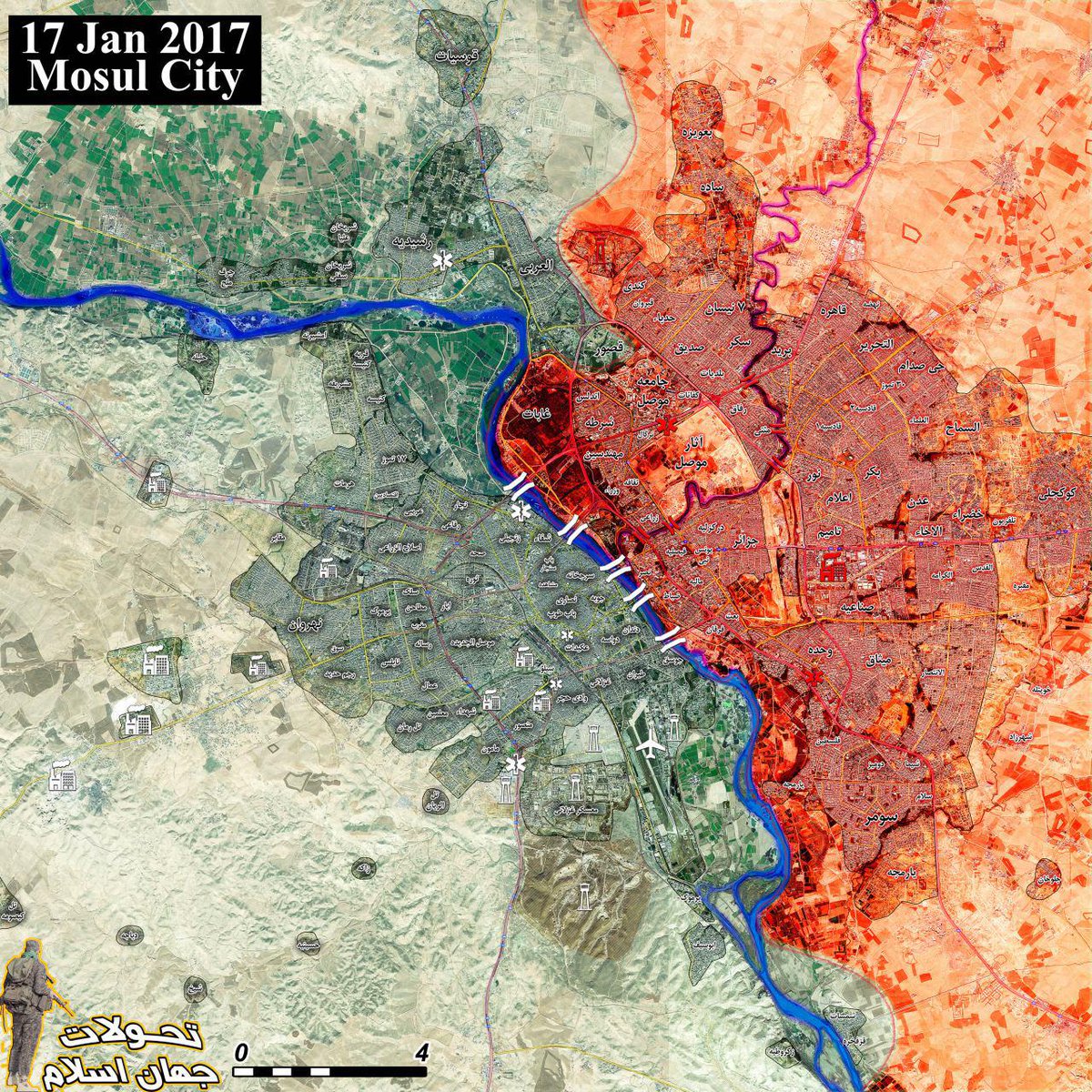
Crossing the Tigris is going to be tough.


Crossing the Tigris is going to be tough.


East Mosul is almost captured


Crossing the Tigris is going to be tough.
Eastern Mosul is now under full control of the Iraqi military.
source: https://www.washingtonpost.com/worl...10fe486791c_story.html?utm_term=.d93cac7fafbb
US SOF unit and Pandur AGMS spotted on the ground in Mosul
US SOF unit and Pandur II AGMS spotted on the ground in Mosul
Presumably Delta Force
US SOF unit and Pandur AGMS spotted on the ground in Mosul
Presumably Delta Force
https://www.stripes.com/news/islami...to-iraqi-troops-general-says-1.451913#gallery
source: http://www.independent.co.uk/news/w...ve-iraq-militants-islamic-state-a7588191.htmlIraqi forces launch offensive to take western Mosul from Isis
Iraqi and US-led coalition officials say they expect the fight for the west to be more difficult as it is denser, with narrower streets and home to more civilians
(...)


This is an incredible display of journalism. Thanks for posting.PBS/The Guardian put out a 30min documentary on the Battle of Mosul that is well worth a watch:
https://www.youtube.com/watch?v=5woZG9fQtqo
Iraqi PMU in Tal Afar, west of Mosul claims to have spotted an unknown aircraft dropping supplies and 6 parachutists
How big a blow is it to ISIS when they lose mosul?
http://musingsoniraq.blogspot.com/2017/02/mosul-campaign-day-130-feb-24-2017.htmlMosul Campaign Day 130, Feb 24, 2017
February 24 the Iraqi forces (ISF) secured the Mosul airport and Ghazlani camp and headed north into the city itself. The Golden Division secured Ghazlani, while the Federal Police and Rapid Reaction Division, supported by armor of the 9th Division did the same for Mosul airport. Large numbers of Islamic State fighters surrendered to the police at the airfield, something that has not really been reported before. This could point to the insurgents morale breaking. The Golden Division then moved into the Maamun Wadi Hajar neighborhoods to the northwest of Ghazlani. The two police units went for Hawl al-Josaq and Dandan, which are directly north of the airport, freeing the latter. The armys 9th Division and the Hashds Al Abbas Division took Tal Ruman that is to the east of Maamun. The ISF were using bulldozers to make new roadways to avoid the main thoroughfares, which have been laced with IEDs. Moving to the outskirts of the city was relatively easy, but now the real fight is beginning as the ISF enter the Mosul itself.
In the last two days the police and armor from the 9th Division moved out of Abu Saif in the south, took the town of Yarmouk. The Golden Div joined in and together they have freed the Mosul Airport, Ghazalni Camp, and entered Tel Ruman, Mamun, Wadi Hajar, Hawl al-Josaq and Dandan. (Medecins Sans Frontieres)
The Hashd in the western Tal Afar district were also busy. They liberated three towns. The Hashd have moved form cutting the supply lines from Tal Afar to Syria to interdicting the lines from Mosul to Tal Afar.
There were constant Coalition air strikes and U.S. Apache helicopters flying overhead as the ISF moved into Mosul. Those were facilitated by U.S. and Coalition advisers, which are now forward deployed at the front with the Golden, Rapid Reaction, and 9th Divisions. The Associated Press talked with U.S. Lt. Colonel James Browning who was working with the 9th Division. He took calls from an Iraqi general on IS locations, which were then confirmed by Coalition surveillance, and then hit with air, helicopter or artillery fire. Before these Iraqi requests would have to be forwarded to the joint operations command in Baghdad before anything could be done taking precious time. Now the call and response period is much quicker. This is part of the Trump administrations more aggressive approach to taking on the Islamic State. As a result, the Americans have loosened the rules of engagement and allowed its troops to be at the front, which has also resulted in casualties. This change in policy will greatly enhance the Iraqis ability to clear areas and advance in the city.
The renewed fighting has led to a new wave of displaced. The Iraq Red Crescent reported that approximately 990 people registered with the government and aid agencies fleeing south Mosul. These civilians were taken to Qayara to the south of the city or to Irbil in the east where camps are set up. For the last few weeks more people were going back to their homes, but that has now been reversed as the battle for west Mosul has begun.
Securing east Mosul is still a major challenge. The National Security Service (NSS) is trying to hunt down IS members. They are collecting information on suspects using information from locals. The NSS however is not the only group doing security duties. There are also army, police, and local Hashd units. These groups hardly coordinate and compete with each other, which has caused all kinds of problems. People are also beginning to complain about the raids and mass arrests. Prime Minister Haidar Abadi is talking about appointing a military governor of Mosul again to try to unify this effort. This idea was brought up before, but nothing came of it. Now that IS is picking up its attacks there is added pressure to try to find a solution.
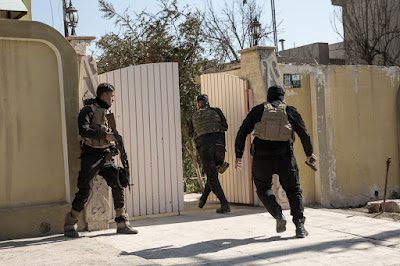
National Security Service raid in east Mosul (Al Jazeera)
The danger facing east Mosul continued. The Iraqi forces interdicted a large force of IS fighters attempting to cross the Tigris River. More importantly residents said that IS is posting threats to people on social networks. The militants recently put up flyers in an east Mosul neighborhood intimidating people as well. These are very serious because if people feel that they are not safe they will eventually stop providing intelligence to the Iraqi forces. If that happens there is no way to root out the Islamic State and they can start rebuilding their networks in the city just as Baghdad has expended so much energy to try to win over the populace by liberating them.
U.S. general Joseph Votel gave a rough estimate of the Iraqi casualties from the battle for east Mosul. He said 500 Iraqi soldiers died and another 3,000 were wounded. More ISF were reported killed in the press, but only around half as many injured. The real figures may never become public as Baghdad is completely adverse to bad news about the war coming out.
Finally, the Oil Ministry announced that another oil well in Qayara had been extinguished. That leaves three wells still ablaze. The field was set on fire when IS was forced out in August, and has been an environmental disaster ever since.

Most of the area around the airport is just empty open desert, which is why that gets taken relatively quickly. Today, the Federal Police tried to be bold and take government complex under the cover of the night in order to quicken the pace of the battle, but ended up stretching themselves too thin and getting surrounded and taking many casualties.

Green = Liberated
Black = ISIL Control
Red = active battles (clashes)
Hours after Mosul's municipal complex was declared liberated by the country's top military commanders and U.S.-led coalition officials, the wounded began pouring into a small frontline clinic just a few hundred meters away.
"Daesh had everything planned," said Hamza Daoud of the Federal Police who helped rush his wounded comrades out of a battered Humvee and onto stretchers in the garden of an abandoned building.
"As we first advanced there was no resistance (from the Islamic State group), but once we entered, they woke up," Daoud said, explaining he was only able to get out by ramming through a makeshift roadblock.
"We were stuck there, nothing could reach us. I barely escaped. The snipers hit my car twice but I never touched the brakes once," he said.
Iraqi forces launched a daring nighttime raid in the early hours of Tuesday morning on the sprawling complex of municipal buildings in western Mosul along the Tigris River. Beginning just after midnight, Iraq's emergency response division, an elite arm of the Federal Police, led the attack. Initially advancing some half a dozen blocks past the front line in armored vehicles, but breaching the complex itself on foot.
After facing very little resistance, regular Federal Police units followed and by 6:30 a.m. Tuesday morning an Iraqi flag had been hoisted above the tallest government building.
But by 11:00 a.m. clashes inside the compound had intensified and commanders behind the front were getting frantic radio calls for help. Three bulldozers had broken down trying to remove roadblocks, hundreds of troops were trapped and they needed reinforcements.
Sgt. Azam Ibrahim of the Federal Police was one of the first to enter the complex, but he and most of his unit fled as the first wave of counterattacks intensified. In the confusion he dropped his side arm before speeding back to his base.
"All of a sudden (IS fighters) began popping up everywhere," he said, "they emerged from nowhere."
Snipers began to fire down on Iraqi forces from the buildings above and previously concealed suicide car bombs rammed their convoys. Ibrahim said he was trapped in the complex for hours as IS fighters moved out from un-cleared neighborhoods and cut the routes his forces used to enter.
Commanders said the hasty advances were intended to give them the element of surprise, but the blunder shows how Iraqi forces continue to struggle with conducting methodical urban operations under political and military pressure for a speedy wrap up to the Mosul war.
http://bigstory.ap.org/article/fbaa...daring-nighttime-raid-turns-deadly-trap-mosulAs IS counterattacks on the municipality ballooned, Iraqi forces responded with artillery Tuesday. A pair of helicopters fired down onto the complex and airstrikes could be heard throughout the day. The sky above the municipality filled with thick black smoke.
Civilians trickled out of the area carrying their possessions in overstuffed suitcases.
"The situation is not good honestly, there is so much destruction," Iman Issam said as she fled with her teenage daughter.
By afternoon, Federal Police units were being sent from the Tayran base to try and free the hundreds of troops in and around the municipality buildings and the front line clinic was receiving casualties in waves.
As one Humvee arrived, two men were pulled from the backseats, their uniforms soaked through with blood. Both were suffering from gunshot wounds. One man had been shot in the leg, the other shot twice in his side causing major bleeding.
The man shot in the side had been hit while trying to drag an injured friend to safety. Medics bandaged his wounds and hooked him up to an intravenous drip, but within minutes he died. Four doctors lifted him into a dark blue body bag and moved him to the ground. A fellow solider piled the man's uniform and boots beside his body.
Speaking from just outside the municipality complex, Federal Police Brig. Gen. Fakher Al Bahadri said he ordered his forces to quickly push deep into Mosul and take the municipality buildings in order to "surprise" the enemy and overcome obstacles posed by western Mosul's terrain. The city's west is much more densely populated than the east and streets are narrow, preventing Iraqi forces from largely fighting from inside their armored vehicles.
"The plan was stupid," Daoud, the Federal Police solider who brought two casualties to the clinic Tuesday afternoon, said. "I don't know why we did that."

Iraqi forces captured the Hurriya Bridge March 6 and prematurely claimed to have taken the government complex, but were ambushed by the Islamic State (BBC)
http://musingsoniraq.blogspot.com/2017/03/mosul-campaign-day-139-40-mar-6-7-2017.htmlMarch 6 the Iraqi forces (ISF) were moving into the middle of west Mosul. First the Federal Police (FP) and Rapid Reaction Division (RRD) captured the Hurriya Bridge. This was the second span across the Tigris that the ISF secured. All of the bridges were knocked out by the U.S. led Coalition during the battle for east Mosul to hinder the Islamic States movement within the city. The FP and RRD also seized a number of government buildings and public works in the Danadan neighborhood. The Golden Division was fighting in the western outskirts and center of the western section of the city and seized Samoud. Finally, Dour al-Sokkar near the Ghazlani Camp just outside of Mosul was also freed.
On March 7 there were more advances. On the western fringe of the city Tal Ruman was declared freed on March 6, and then fully cleared the next day. The FP and RRD liberated Dandan, Dawas, and Mohana, and attacked Nabi Sheet once again. Dandan had been liberated two times before. The Golden Division on the other hand, attacked Shuhada, Muallemin, and Okaidat, and was still fighting in Mansour. The ISF claimed it was in Shuhada more than a week before it had even reached the area. The Iraqis have a bad habit of exaggerating how far they have moved ahead.
March 7 also witnessed a major setback. The police forces declared they seized the government complex near the Tigris River early in the morning. The RRD launched a surprise night attacked and rushed to the government center followed by the Federal Police. An FP general told the press he wanted to catch the Islamic State unaware. What the police did not do was clear their route. Just before noon IS began counter attacking and surrounded the police. Federal Police reinforcements had to be sent in to fight there way through the insurgent lines and rescue the trapped officers. The Federal Police commander wanted a propaganda victory by hoisting the Iraqi flag over the government buildings and sacrificed an unknown amount of his men for a short lived victory, which ended in a retreat. A similar fiasco occurred in the battle for east Mosul when the armys 9th Division made a quick thrust towards a major hospital complex only to find out it was a trap set by the militants, and had to be saved costing a large number of casualties. The Iraqi forces are currently maintaining a multi-front operation against Mosul, but still suffer from these occasional poor choices.
To the southwest the 9th Division and the Al-Abbas Division of the Hashd entered the Badush area. They captured part of the prison there, which was the site of hundreds of executions by the Islamic State. As happens too many times the army claimed it had seized the prison a week ago. Two towns in the district were cleared as well. The army and Hashd are trying to cut off Mosul from the west, and will eventually push into the city itself.
Out in the west the Hashd said that Tal Afar had been completely isolated and they were preparing to take it. The fate of the town however, remains up in the air with Iraqi officials constantly switching back and forth between the Hashd and the ISF liberating the town. Despite all the announcements nothing is likely to happen until the battle for Mosul is finished.
Civilians are taking the brunt of the fighting. Unidentified and Coalition air strikes were blamed for the deaths of 116 people and 140 wounded. Iraqi artillery cost the lives of 5 more. Islamic State mortars left 7 fatalities and 26 injured. The insurgents executed 35 people, and a mass grave was discovered in east Mosul with 50 victims of IS.
The Golden Divisions Abdul Ghani al-Assadi and Ninewa Operations commander General Najim Jabouri claimed that the United States had provided equipment that jammed IS drones. General Saadi was quoted as saying the number of drone strikes dropped from 72 to 52 and then eventually down to 0. Ironically on March 8 video was released of General Saadi being buzzed by an IS drone in Mosul so this story appears to be an exaggeration. These devices have been more of a nuisance than a real threat to the ISF. Their most important use was to spot targets for IS mortars and car bombs.
The Americans noted that on the tactical level the fight for west Mosul is still a hard slog, but strategically the insurgents are defeated. According to Colonel John Dorrian the Islamic State is not able to stop the advance of the Iraqi forces. General Matthew Isler added that the militants defenses were not well organized or coordinated. U.S. statements have been cautiously optimistic about the Mosul campaign.
Huge numbers of people are still flowing out of west Mosul. The United Nations High Commissioner for Refugees (UNHCR) talked with a woman who fled the city because her family had been starving for a month. She was feeding her kids water and flour, sometimes with some tomato paste added. Over 50,000 have left the western section of the city pushing the total number of registered displaced to 211,572. These people are overflowing the camps set up for them. The ones to the south of Mosul are full, and the ones in Kurdistan are almost at capacity The UNHCR just opened a new camp 20 kilometers to the east of Mosul to try to accommodate the new outflow. When the Mosul campaign started in October 2016 the government told people to stay in their homes because neither it nor the aid agencies had the money or capacity to help them. Now their resources are being strained with no relief in sight.
The pro-Iran Hashd made their weekly attack upon the Americans. Asaib Ahl Al-Haq spokesman Jawad Talabawi accused the United States of dropping supplies to the Islamic State in Mosul and evacuating its senior leaders out of the city. He went on to state that the Hashd had stopped the U.S. from doing the same in Tal Afar. Tehrans allies in Iraq have been making these types of statements since 2014 to try to undermine Washingtons position in the country.
The Christian Science Monitor had an uplifting story of how Mosul was trying to rebuild via education. While the Islamic State ran the city for two years very few kids got an education. Those that went to school were taught ISs form of Islam and prepared for war as much of the curriculum used martial terms such as counting guns or bullets for math. Now classrooms are overflowing. This is the start to what promises to be a long process of trying to make up for what the insurgents did to Mosul, and Iraqi society in general. A former professor from Mosul University thought it would take 5-10 years to heal all the damage that was done.
Finally the brewing political disputes over the future of Ninewa continued. A parliamentary (MP) told New Sabah that the Arab parties were opposed to former Governor Atheel Nujafi and current Vice President Osama Nujafis plans to make the province a federal region. The MP went on to say that the Nujafis were working with the Kurds to fragment Ninewa. These arguments will only increase as more time passes as there are a plethora of forces vying to control Ninewa ranging from the Nujafis to Kurdish President Massoud Barzanis Kurdistan Democratic Party (KDP) to Prime Minister Haidar Abadi to the standing provincial government to Turkeys Kurdistan Workers Party (PKK) to Turkey itself to the various minority groups that reside there.
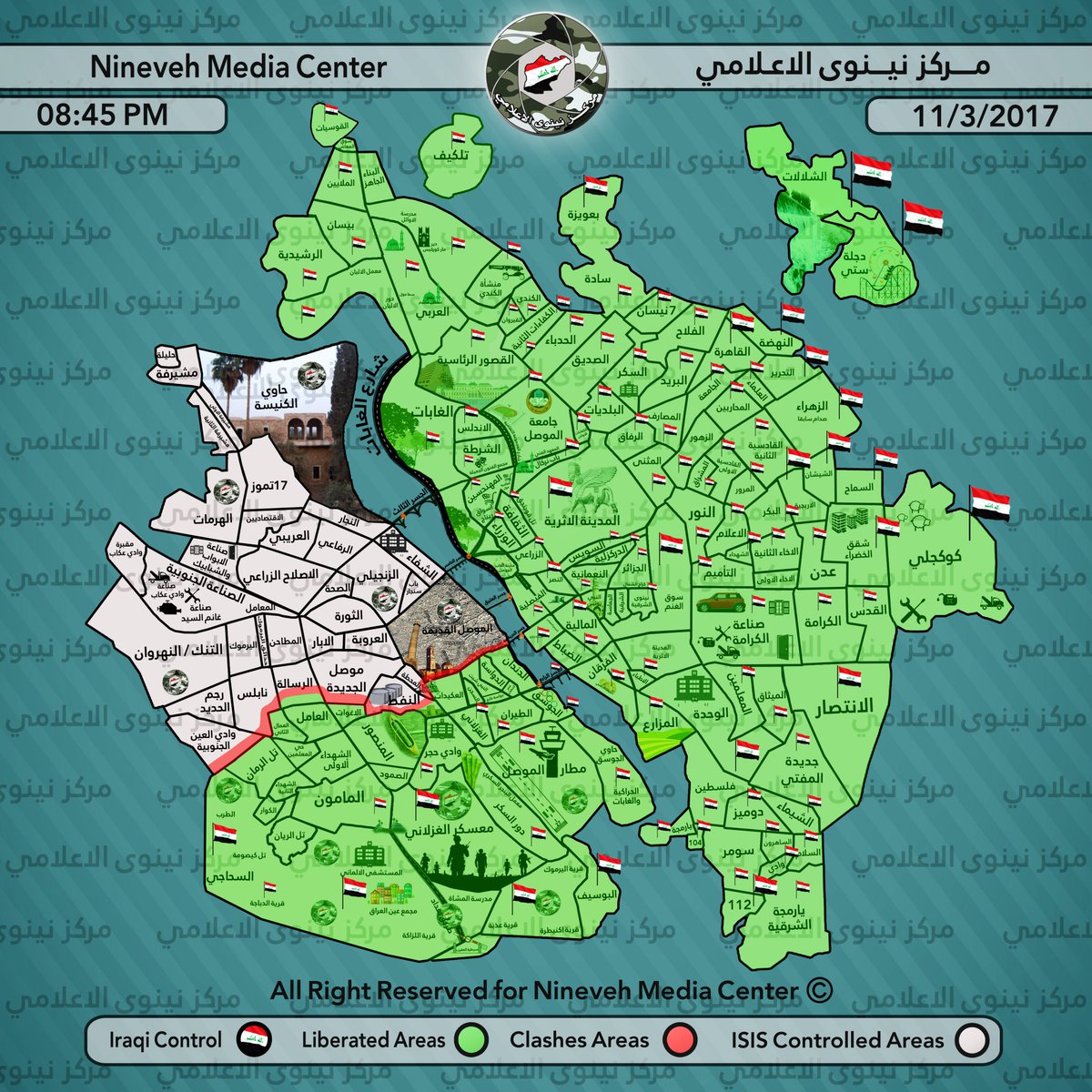
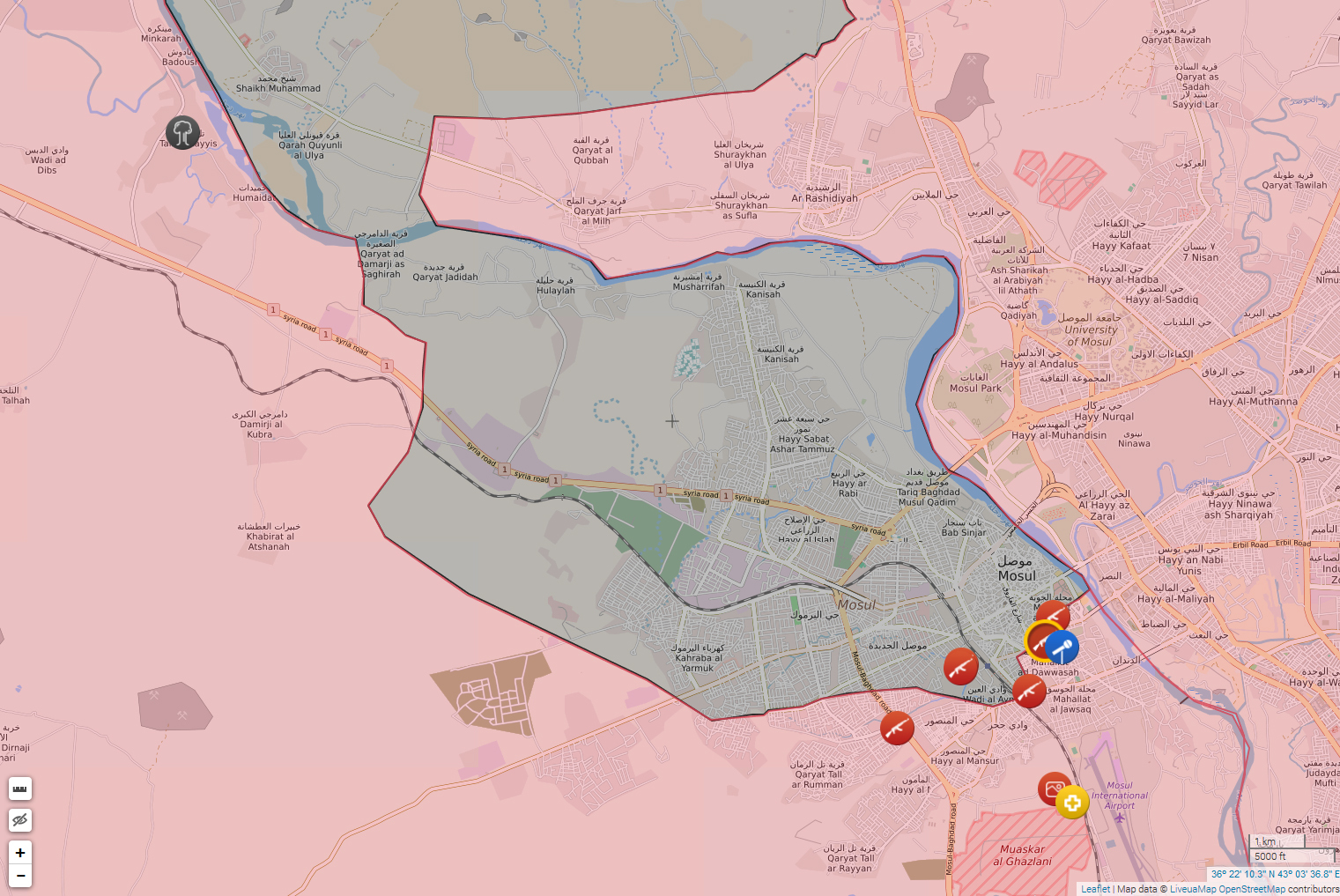
So, 1/3 of West Mosul is liberated, Iraqi forces expanding pretty fast.
And the last road out of Mosul is also occupied, ISIS is basically trapped and fucked even more, it's just a matter of time.
Depending on the momentum I give them two or three weeks until Mosul is liberated completely.

Yeah, West Mosul is basically trapped.West Mosul is now completely surrounded isolating all links between Tell Afar and the last few occupied areas inside the city. Victory is so close.
Yeah, West Mosul is basically trapped.
They made good progress since my last post, Iraqi forces control three bridges now and almost occupied the centre.
This will end in two weeks.
So apart from west Mosul, does ISIS still have large operations elsewhere?
So apart from west Mosul, does ISIS still have large operations elsewhere?
There is almost 0 talk of this anymore, it seems the American news organization spend 99% of the time talking about Trump
Since the operation in Mosul began, they started going on the offensive in Syria and nearly pushed the Syrian Government forces out of Palmyra (again) but recently there has been a counter-offensive to push ISIS back out again.
Turkish-backed Euphrates Shield forces had a very messy battle with ISIS, but ultimately took Al-Bab from them
Currently there is an ongoing battle with US-backed Syrian Democratic Forces in Raqqa and with the Syrian Government Forces in eastern Aleppo
Mosul Campaign Day 139-40, Mar 6-7, 2017
http://musingsoniraq.blogspot.com/2017/03/mosul-campaign-day-139-40-mar-6-7-2017.html
After ISIS is defeated, these Iran-backed groups are going to become the next big problem in Iraq
Lebanon has gone through neverending civil wars too, and is made up of a patchwork of different religions, tribes, ethnicities, etc. They are doing relatively well, and is quite a stable country despite accepting almost 100,000 Syrian refugees (despite being a tiny country). They have a confessionalism government which is inclusive of all diverse backgrounds and has checks in place. Current Iraqi government is sorta there but not there. They need to do more if they want to follow Lebanon's example.It seems the issues for Iraq is never going to end. I wonder, once ISIS is defeated how will the people in the Middle East look at this event. ISIS has been one of the most successful( at a time) and brutal terrorist groups in the Middle East, and has committed many atrocities and perverting Islam. I don't know how people will people move on, especially the ones that directly affected by the group.
Lebanon has gone through neverending civil wars too, and is made up of a patchwork of different religions, tribes, ethnicities, etc. They are doing relatively well, and is quite a stable country despite accepting almost 100,000 Syrian refugees (despite being a tiny country). They have a confessionalism government which is inclusive of all diverse backgrounds and has checks in place. Current Iraqi government is sorta there but not there. They need to do more if they want to follow Lebanon's example.
Mosul will fall in a matter of days. ISIS will be pushed to the marshes.
Raqqa is a bigger story right now. SDF hasnt lost a single battle so far, and shows that backing the right forces can be a good outcome.
I don't know if being in Lebanon situation is a good example.
Iraq after ISIS is going to deal with the economic devastation of the war, dozens of armed groups and some won't leave, the presence of competing foreign powers within the country( the US, Turks, Iranian-backed groups, etc) and including domestic groups like the Peshmerga, continuous presence of insurgent groups, and the economy won't likely to recover because of low oil prices.
The news about Iraq with dwindle once ISIS is rooted out, but the problems won't go away. I only hope that things will recover quickly.
Lebanon has gone through neverending civil wars too, and is made up of a patchwork of different religions, tribes, ethnicities, etc. They are doing relatively well, and is quite a stable country despite accepting almost 100,000 Syrian refugees (despite being a tiny country). They have a confessionalism government which is inclusive of all diverse backgrounds and has checks in place. Current Iraqi government is sorta there but not there. They need to do more if they want to follow Lebanon's example.
http://www.lemonde.fr/photo/portfol...-en-images_5095613_4789037.html#meter_toaster
My bad, I mixed Lebanon up with another gulf country. But yeah, Hezbollah is a huge unifying force in Lebanese politics. But keep in mind that Lebanon is split evenly between Shias and Sunnis.100,000? Lebanon has taken in about 2 million Syrian refugees.
And don't forget that Hezbollah -backed by Iran - has a strong foothold in Lebanon. That's one of the main reasons it's calm there.
Can't wait for Trump to claim credit for all of this by the way.

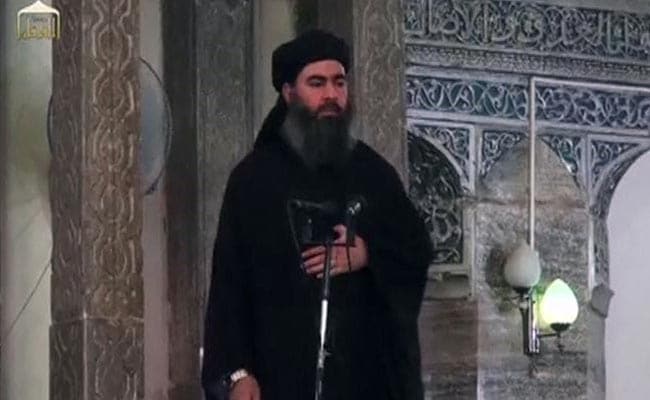

Man, West Mosul has been a stalemate. Fuckin ridiculous

Also, an article warning about the recovery of ISIS
The operation to clear the Islamic State (IS) from its Iraqi capital, Mosul, began on 17 October and is now 188 days old. IS was announced cleared from east Mosul on 25 January, and the offensive that began on 19 February to clear the more densely-populated and difficult west Mosul has ostensibly swept IS from sixty percent of that area. Official sources claim IS now controls less than seven percent of Iraqi territory, down from forty percent in 2014. But yesterday, a car bomb struck Zuhur, the first attack of this kind in east Mosul since February, murdering at least four people. This is part of a pattern of attacks that suggests the Mosul operation itself was rushed and more importantly that IS is already recovering in liberated areas.
When the Mosul offensive began, there was reason to worry that the timing was more political than it was determined by facts on the ground. Towns like Qayyara and Shirqat, which had been formally cleared of jihadists and were being used as launchpads for the assault on Mosul, were under constant harassment from the rural surroundings. More important is Hawija, which IS continues to hold.
Hawija, a town of about 200,000 people, fell to IS on 16 June 2014, after Mosul collapsed on 10 June and IS swept across northern and central Iraq. Located one-hundred miles south-east of Mosul, and roughly equidistantforty miles or soeast of Shirqat and west of Kirkuk, with Bayji and Tikrit within sixty miles to the south, Hawija sits in a prime location to cause mayhem behind the lines, and has done so. IS is able to organize attacks from Hawija, and then fall back to safe-haven in the city. Days into the Mosul operation, IS executed a major raid in Kirkuk that killed dozens of people; the jihadists that did not blow themselves up slipped back into Hawija. This has happened despite the Kurdish Peshmerga having imposed a siege last August and blocked the four city gates.
In simple military terms, Hawija should have been cleared before Mosul, and now there are new worries. The recent announcement, which might well prove untrue, that ISs occupation of Hawija, an overwhelmingly Sunni Arab town, will soon be brought to an end by al-Hashd al-Shabi, the conglomeration of Shii militias where Iranian proxies are the backbone, and the Kurdish Peshmerga, would continue one of the worst aspects of the campaign against IS, namely the use of demographically inappropriate forces to cleanse local areas that has meant ISs military losses are not political losses.
http://henryjacksonsociety.org/2017/04/22/analysis-signs-of-recovery-for-the-islamic-state/In 2007-08, IS had been politically isolated and militarily driven from its cities by the Surge and Sahwa. Throughout 2010, the organizations leadership structure was nearly destroyed. Yet in 2011, the IS movement was into a recoveryso much so it dispatched operatives into Syria to form a secret branch. By 2013, even as it underwent a schism with its Syrian wing, IS had nearly eliminated the Sahwa and launched a campaign of terrorism, particularly against the prisons, that freed important operatives, and seriously destabilized the Iraqi government. The heavy-handed reaction of the government, and its increased reliance on Iran, only fed IS. How had IS recovered in just five years?
Western inattentiveness was certainly part of it: the belief the Surge was a done deal rather than a process to be maintained. The political disengagement after 2009 allowed the worst, most sectarian and authoritarian instincts of the Iraqi Prime Minister free rein, polarizing the Sunni community, and IS reaped the benefits of that. IS did also realize it had made mistakes; it reassessed some tactics, especially in dealing with the tribes, though maintained remarkable continuity in ideology.
Still, the major part of the answer to ISs resilience lies, as Craig Whiteside has written, in its deeply bureaucratic structure and strategic outlook that gives it the ability to wage a Mao-style revolutionary warfare. IS has proven capable of moving through the three stages: an infiltration and building stage by terror and inducement; expansion with terrorist and insurgent tactics; and then into the decisive phase of governance and state administration. Just as importantly, IS can move back through the stages when necessary.
This means ISs loss of territory should not be seen as the sole measure of how this war is going. What is needed in a revolutionary war is legitimacy over the long-term; if military defeats contain political victories, they can be absorbed, which is why IS has chosen simply to retreat in most areas before the attacks on its capitals. Fallujah was a classic case: IS held about two-thirds of the city; after evidence of atrocities by the Shia militias appeared, giving IS a political win, it pulled out within five days. The U.S.s narrow focus on defeating IS, with the mistaken emphasis on when IS is defeated rather than how, has meant supporting Iranian-run Shia militias in Iraq and the PKK in Syria, playing into ISs hands, legitimizing the group even as it loses territory, and assisting IS becoming a global movement that can mobilize its supporters abroad for external attacks.
The holding of a specific territory has never been the basis of ISs legitimacy. Over the last year, IS has crystallized this view that the caliphate is more a cause than a destination, presenting the impending loss of its twin capitals, Mosul and Raqqa, as merely one stage in a cycle, part of the travails of the believersa gift from god, indeedto purify the herd before final victory. After inflicting terrible losses on the infidels, the jihadists will retreat into the desert temporarily, as they did last time only with hideouts stretching into Syria this time as well, and come back stronger, IS says. Given the conditionsno major U.S. troop presence on the ground; massive destruction, displacement, and persecution in the Sunni areas; heightened sectarianism; dysfunctional political systems all across the Fertile CrescentISs belief that trends are on its side even more than in 2008 cannot be dismissed as self-serving delusion. In some areas those trends toward ISs recovery are already becoming a reality.

Counter-Terrorism units claim that they've liberated the Wadi Akab & Sayed Ghanam industrial districts and encirclement is nearly complete

